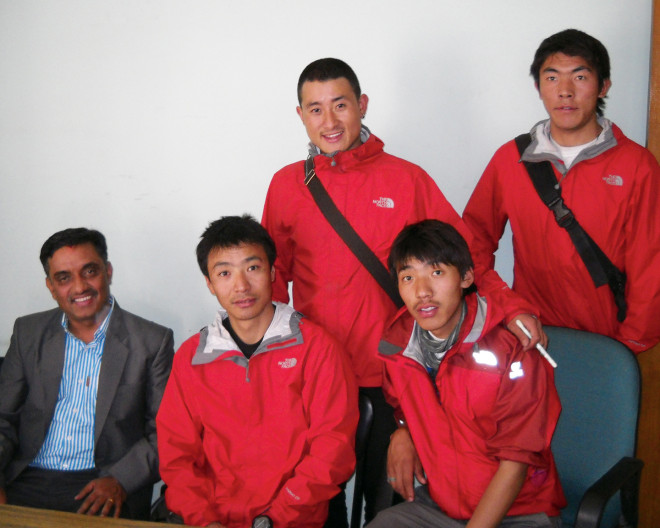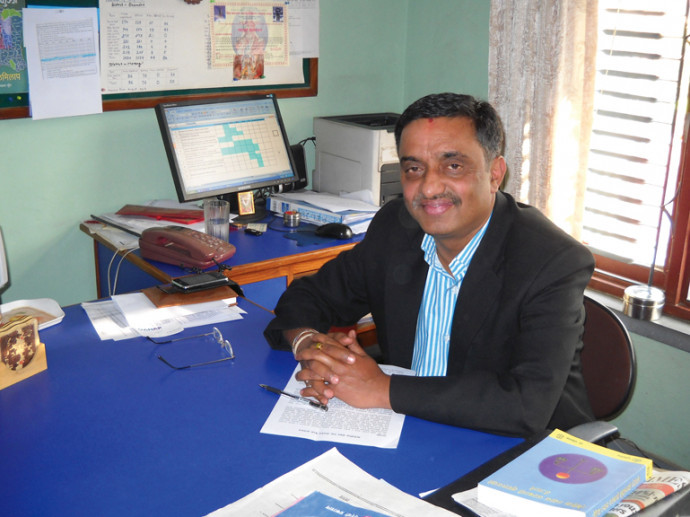Saving Nepal and the Planet, One Lawsuit at a Time
By Lin Harmon ’91
Founded and headed by Prakash Mani Sharma ’99, the independent nonprofit seeks to “play the role of a social change agent to empower the Nepalese people through research, advocacy, litigation, and capacity building.”
Pro Public’s Kathmandu offices buzz with activity from early morning until late evening—not surprising, given that sweeping mission of the organization. Founded and headed by Prakash Mani Sharma ’99, the independent nonprofit seeks to “play the role of a social change agent to empower the Nepalese people through research, advocacy, litigation, and capacity building.” It has been successful, to put it modestly. A string of powerful legal precedents and the backing of an international network of public interest lawyers have made Pro Public one of the most effective public interest organizations in the world.
Sharma was a corporate lawyer when, in 1989, he took on a career-changing case against a marble company whose quarry operations were severely damaging the local landscape. He convinced the country’s Supreme Court that there should be a “right to life” enshrined in the constitution, and that polluters infringed this fundamental right.
As a result of the case, Nepal developed an environmental law.
Sharma founded Pro Public in 1991 to keep the momentum going. The organization now has more than 170 staff working in 12 offices throughout Nepal on a wide range of issues related to environmental justice, gender equality, governance, and corruption. The staff includes environmentalists, women’s rights activists, lawyers, journalists, engineers, and economists. Pro Public’s organizing vision is simple: “Nepalese people’s basic rights are guaranteed through social, economic, environmental, and political justice.” The vision is, however, anything but simple to achieve.
Pro Public works in a setting that would daunt many hardcore advocates in developed countries. Nepal, a land of ironic contrasts, is rich in natural and cultural resources but is one of the world’s poorest nations. Life expectancy here is among the shortest in the world, fewer than half the people can read and write, and unemployment at times approaches 50 percent. Home to eight of the world’s ten highest peaks, including Mount Everest on the border with China and Kanchenjunga on the border with India, Nepal relies heavily on tourism. But the tourist economy is periodically shaken by serious political turmoil, which threatens the rule of law; Maoist demonstrations and guerilla warfare periodically bring the government to a standstill. To complicate matters, Nepal’s strategic location between China and India, combined with an influx of immigrants from both neighbors, makes governance even more difficult. Tourism income is also affected by the vehicular pollution in urban Kathmandu, which causes many visitors to don masks against the diesel-infused air. The poverty of the country means that government often does not have sufficient resources to enforce its environmental, human rights, and other laws.
Against this backdrop, Pro Public’s accomplishments—oft-cited examples of how a nongovernmental organization, armed with patience, vision, and strategic legal arguments, can help guide a poor nation along the path to sustainable development—are all the more remarkable.
Early Successes
The marble quarry case was only the beginning. Sharma had established a number of significant precedents by the time he arrived at Lewis & Clark.
Protection of the Rani Pokhari (1997)
The “Queen’s Pond” (rani pokhari), a rectangular lake adjoining a Muslim-style Hindu temple to Shiva, lies in the heart of Kathmandu. The pond was created by King Pratap Malla to console his queen in 1670, after their son was trampled to death by an elephant. According to legend, Pratap Malla brought holy water from various pilgrimages to fill the pond. It is surrounded by statues, temples, and monuments of great historic value, but over the last few decades government buildings gradually obscured, and then completely encircled, the pond. In order to restore the historical cultural and scenic value of the site, Sharma brought a lawsuit seeking to have the recent government buildings razed and the area restored. He first overcame government standing objections by arguing that the integrity of the area was a matter of “public right” or “concern” under Article 88(2) of the constitution, which the Supreme Court agreed was sufficient for individual standing under Nepali law. Sharma then unleashed the dormant power of the “directive principles” incorporated under Part Four of
the constitution, overcoming government arguments that the principles were simply unenforceable policy guidance. The Court held, “Henceforth, the directive principles and state policies under Chapter Four of the Constitution are not worthless provisions and these provisions cannot be abrogated. If these provisions are violated, at such time the court can issue necessary order in order to give effect to the directive principles.” The court ultimately ordered the relevant agencies to monitor compliance with their obligations under the 1972 Convention Concerning the Protection of World Cultural and Natural Heritage and Nepalese laws and to proactively formulate national policies to protect objects of religious, cultural, and historical importance.
Protection of the Kathmandu Valley (1997)
Sharma sued His Majesty’s Government Cabinet Secretariat in a sweeping action to stop the well-established pollution of the Kathmandu Valley, which was due to rapid urbanization, overpopulation, deforestation, industrial operations, fossil fuel–powered traffic, unplanned settlements, and construction of large buildings. The Supreme Court again found standing for a public concern. It also found that Article 26(4) of the constitution of Nepal required the government to give priority to environmental protection and to preventing further damage due to physical development activities. Although it declined to extend its ruling to an injunction against any particular building construction, the court directed His Majesty’s Government Cabinet Secretariat to monitor agency compliance with the 1972 Convention Concerning the Protection of World Cultural and Natural Heritage and Nepalese laws, and then to take action to protect all areas by formulating national policies regarding objects of religious, cultural, and historical importance.
Protection of public lands (1997)
The Nepalese government sold an unspoiled piece of land in the Balkhu district of Kathmandu to a news corporation to develop a newspaper factory. Sharma challenged the arrangement and the Supreme Court issued an order quashing the sale. The area is nowa public park where children can play sports.
New Millennium, Old Challenges
Since receiving his environmental law education at Lewis & Clark and returning home in 1999, Sharma has drawn on the help of Professors Craig Johnston ’85 and Chris Wold ’90, among others, in his unflagging campaign to conserve Nepal’s natural resources and improve the environment and public health. Inaction or corruption in government offices often forces further legal action for contempt after Sharma obtains a judgment from the Supreme Court; winning a case is just the start of a protracted struggle for enforcement.
Among other ongoing environmental and public health initiatives, Pro Public has waged legal battles over the following issues:
Bagmati River pollution (2001)
The Bagmati River, which has sacred significance for Nepalese people, runs through the urban area of Kathmandu. Although Nepal has laws regulating discharges into the river, they were not enforced and the river became black and putrid; waste piles seeped into groundwater recharge areas and posed a threat to Kathmandu’s water supply. In 2000 Pro Public filed a lawsuit against government agencies in the Kathmandu Valley to prevent garbage dumping on the banks of the river, alleging the dumping violated citizens’ constitutional rights to a healthy environment as well as environmental laws that require government agencies to assess the environmental impacts of proposed waste disposal projects. In a 2001 order, the Supreme Court ordered local government officials to stop dumping Kathmandu’s waste along the Bagmati River and to study the environmental impacts of using a site for waste disposal before dumping is allowed.
Vehicular pollution (2003)
After a long-running Pro Public campaign to stop pollution from diesel and gasoline vehicles in the Kathmandu Valley, the government finally offered lead-free fuel and set emissions standards. Then, they failed to enforce the laws. In 2003 the Supreme Court issued a directive order to enforce essential measures to protect public health from vehicular pollution in the valley due to emission from vehicles and to conduct essential studies or investigations with a view to prevent vehicular pollution outside Kathmandu Valley.
Illegal brick kilns (2005)
Brick kilns produce prodigious amounts of atmospheric contaminants, and illegal brick kilns lacking pollution control devices were threatening the health of Kathmandu Valley’s 1.5 million residents. After a nine-year legal battle led by Pro Public, in 2005 the Supreme Court of Nepal ordered the closure of all illegal brick kilns in Kathmandu Valley.
Smoking in public places (2006)
Pro Public successfully argued for a ban on smoking in public places, presenting mountains of scientific information from its partners documenting the hazards of tobacco as well as model tobacco laws from around the world. The 2006 Nepal Supreme Court victory not only banned smoking in public places, but also imposed restrictions on tobacco advertising and ordered public education campaigns on the dangers of tobacco use.
Groundwater conservation (2010)
Groundwater resources in the Kathmandu Valley are declining due to unplanned urbanization and industrial activities. According to a recent report, Kathmandu’s groundwater level is sinking at an alarming average of 2.5 meters annually. Although Nepalese law requires permits for industrial groundwater extraction, and requires that groundwater be used only for drinking water and sanitation, the government’s lack of enforcement created a situation of indiscriminate exploitation of groundwater through illegal deep wells operated by factories, hotels, and rapidly growing housing developments. After Pro Public filed suit, the court was forced to take notice that there was no agency appointed to implement the law. At Pro Public’s urging, the Supreme Court issued a mandamus ordering government agencies to follow the provisions of the Water Resources Act, enforce the licensing system, and control illegal exploitation of groundwater.
Poaching of endangered rhino (ongoing)
The government discontinued security posts meant to guard against poachers in Chitwan National Park, resulting in the loss of over 100 endangered one-horned rhinos to date. An ongoing case seeks to stop the illegal poaching. Sharma successfully obtained a Supreme Court order mandating the government reinstate security posts and take other measures to protect the rare rhino, and ordered the authorities to include experts from the Ministry of Environment, Science, and Technology; Ministry of Defense; and Pro Public in a panel to come up with corrective measures. Nonetheless, the species is still in decline. A verdict on Pro Public’s contempt case is in process.
Pesticide dumping ban (ongoing)
Pro Public obtained mandamus from the Supreme Court ordering government agencies to stop dumping pesticides near schools, safely dispose of pesticides in general, make public areas safer for children and residents, study the impact of pesticides on the health of local residents, provide free medical treatment, and establish a fund for compensation of injured persons.
Right to food (ongoing)
There is much food scarcity and starvation in the far west of Nepal, but not for lack of adequate national food supply. Corruption in the government food corporation means that food is not sent at critical times, such as monsoon season. Sharma obtained an interim order forcing emergency food management. A final judgment is in process.
Saving the Himalayas
Perhaps the most wide-reaching campaign of Sharma’s career is his push to stop climate change from devastating the Himalayas, melting the glaciers that are the source for rivers on which billions in Southeast Asia depend. As Sharma said in a Friends of the Earth interview, “The Everest (Sagarmatha) National Park, home to the Himalayas, is a unique and irreplaceable landscape—undoubtedly one of the most beautiful places on earth. Yet many of its glacial lakes are in grave danger of catastrophic flooding, as the mountain glaciers high above them steadily melt away—according to recent EC studies, at the rate of 15 meters a year. Should any of the glacial lakes burst its banks, that would result in a human, environmental, and economic disaster, threatening thousands of local inhabitants and their homes and livestock, as well as rare animals such as the snow leopard and panther, and the country’s hydropower plant facilities.” He noted that Nepal’s principal source of income, the tourist industry, would be irreparably damaged, and “if the glaciers were eventually to disappear completely in a few decades’ time, so too would our fresh water supply.”
In 2004, a worldwide consortium of advocates for three threatened World Heritage Sites filed petitions with the UNESCO World Heritage Committee to declare their sites in danger, a legal status that triggers a higher level of protection under the World Heritage Convention. In leading the charge for Nepal, Sharma received help from Wold and Lewis & Clark’s International Environmental Law Project in filing Pro Public’s petition to list Sagarmatha (Everest) National Park. Sharma presented the petition in person in Paris with a group of record-holding Everest climbers, including Pemba Dorjee Sherpa, world’s fastest climber of Everest, and Temba Tsheri Sherpa, world’s youngest climber of Everest. (Other legal petitions submitted to the Committee in Paris asked for the Huasacarn National Park in the Peruvian Andes and the Belize Barrier Reef to be listed. The following year, IELP filed a petition on behalf of the Waterton-Glacier National Parks in Canada and the United States.)
Over the next two years, the World Heritage Committee acknowledged the climate change problem, but it bowed to political pressure and refused to grant the petitions. UNESCO did publish findings from its major study in 2006 as a report to the U.N. General Assembly, including these: “In Sagarmatha, Nepal, air temperatures have risen by 1°C since the seventies, leading to a decrease in snow and ice cover of 30% in the same period and replacing a 4000 m high glacier on Mount Everest by a lake. Glacier lake outburst floods are now much more frequent, creating serious risks for human populations and having implications for the water supply in South Asia and the flow of major rivers such as the Ganges, Indus, and Brahmaputra.”
Prakash Sharma is not one to take “no” for an answer. In 2006, he embarked on a “Climate Justice” tour and talks in the United States, hosted by Friends of the Earth in Washington, D.C. There he met and spoke with a number of senators, including Barack Obama. He reportedly told the then-senator, “We need people like you to run for president of the United States.” Last year, in the lead-up to the Copenhagen climate talks, Sharma embarked on a tour of Australia, traveling once again with world-record climbers Pemba and Temba to speak at public forums in Sydney, Brisbane, Canberra, and Melbourne, where the documentary Big Melt was shown.
Sharma shows no signs of slowing down in his relentless campaign for a clean, green, just future for Nepal and a solution to the problem of climate change. He expresses happiness that his alma mater has excellent course offerings in environmental justice, and he welcomes the Law School’s environmental law students and alumni to visit Nepal to learn more.

A note from the author
I was fortunate enough to visit Pro Public in March, and happened to be there at a time when Pemba, Tempa, and other Sherpas were arriving for a meeting with Sharma. He is setting up the Pemba and Temba Foundation to work for climate justice and provide scholarships for the families of deceased Sherpas. The Sherpa group was about to embark on a trek to bring a full ton of garbage left by mountain climbers down from the peaks. Their enthusiasm for their work and for saving the Himalayas was contagious; anyone interested in supporting their cause is welcome to contact Sharma to make a donation. Information is available at www.propublic.org.
More Advocate Magazine Stories
email jasbury@lclark.edu
voice 503-768-6605
Judy Asbury, Assistant Dean, Communications and External Relations
Advocate Magazine
Lewis & Clark Law School
10101 S. Terwilliger Boulevard MSC 51
Portland OR 97219


